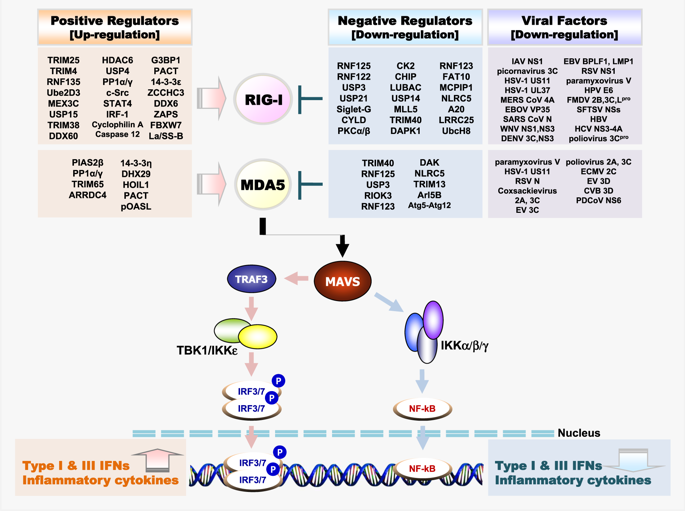当前位置:
X-MOL 学术
›
Exp. Mol. Med.
›
论文详情
Our official English website, www.x-mol.net, welcomes your feedback! (Note: you will need to create a separate account there.)
Intracellular sensing of viral genomes and viral evasion.
Experimental & Molecular Medicine ( IF 12.8 ) Pub Date : 2019-12-11 , DOI: 10.1038/s12276-019-0299-y Hyun-Cheol Lee 1, 2 , Kiramage Chathuranga 1 , Jong-Soo Lee 1
Experimental & Molecular Medicine ( IF 12.8 ) Pub Date : 2019-12-11 , DOI: 10.1038/s12276-019-0299-y Hyun-Cheol Lee 1, 2 , Kiramage Chathuranga 1 , Jong-Soo Lee 1
Affiliation

|
During viral infection, virus-derived cytosolic nucleic acids are recognized by host intracellular specific sensors. The efficacy of this recognition system is crucial for triggering innate host defenses, which then stimulate more specific adaptive immune responses against the virus. Recent studies show that signal transduction pathways activated by sensing proteins are positively or negatively regulated by many modulators to maintain host immune homeostasis. However, viruses have evolved several strategies to counteract/evade host immune reactions. These systems involve viral proteins that interact with host sensor proteins and prevent them from detecting the viral genome or from initiating immune signaling. In this review, we discuss key regulators of cytosolic sensor proteins and viral proteins based on experimental evidence.
中文翻译:

病毒基因组的细胞内传感和病毒逃逸。
在病毒感染期间,病毒衍生的胞质核酸被宿主细胞内特异性传感器识别。这种识别系统的功效对于触发先天宿主防御至关重要,然后会刺激针对病毒的更具体的适应性免疫反应。最近的研究表明,由传感蛋白激活的信号转导通路受到许多调节剂的正向或负向调节,以维持宿主免疫稳态。然而,病毒已经进化出几种策略来对抗/逃避宿主的免疫反应。这些系统涉及与宿主传感器蛋白相互作用并阻止它们检测病毒基因组或启动免疫信号的病毒蛋白。在这篇综述中,我们根据实验证据讨论了细胞溶质传感器蛋白和病毒蛋白的关键调节因子。
更新日期:2019-12-11
中文翻译:

病毒基因组的细胞内传感和病毒逃逸。
在病毒感染期间,病毒衍生的胞质核酸被宿主细胞内特异性传感器识别。这种识别系统的功效对于触发先天宿主防御至关重要,然后会刺激针对病毒的更具体的适应性免疫反应。最近的研究表明,由传感蛋白激活的信号转导通路受到许多调节剂的正向或负向调节,以维持宿主免疫稳态。然而,病毒已经进化出几种策略来对抗/逃避宿主的免疫反应。这些系统涉及与宿主传感器蛋白相互作用并阻止它们检测病毒基因组或启动免疫信号的病毒蛋白。在这篇综述中,我们根据实验证据讨论了细胞溶质传感器蛋白和病毒蛋白的关键调节因子。



























 京公网安备 11010802027423号
京公网安备 11010802027423号